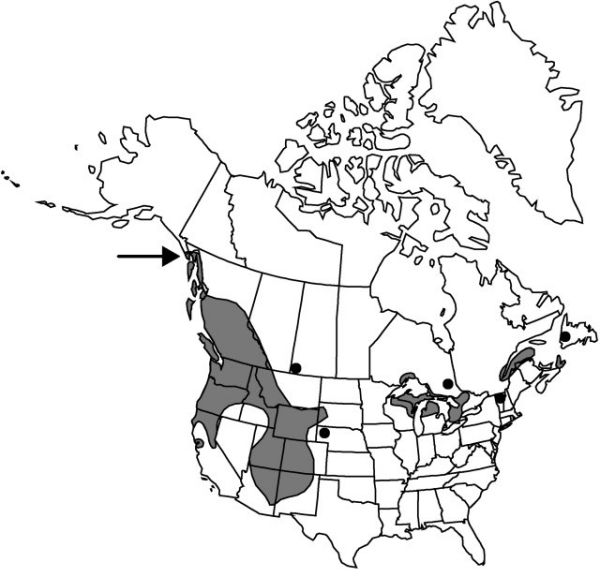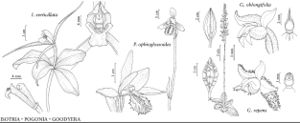Goodyera oblongifolia
Herb. Raf., 76. 1833.
Leaves: blade usually streaked with white only along midrib, sometimes with fine white lateral veins, especially near midrib, narrowly elliptic to ovate, 2.5–10.2 × 1.3–3.5 cm, apex acute. Inflorescences densely to loosely spiraled or secund, 10–48-flowered; peduncle 7–38 cm. Flowers: lateral sepals 5.7–7.8 mm; petals connivent, hood 5–10 mm; lip deeply concave, boat-shaped, 4.9–7.9 × 1.3–3.2 mm, margins upright or involute, apex spreading or slightly recurved, blunt, inner surface with 4 unequal rows of glandular papillae; anther erect, base 1/3–1/2 immersed in cup-shaped clinandrium, apex acuminate; pollinia acuminate; rostellar beak 2-pronged, 2.3–3.6 mm, longer than body of stigma; viscidium elongate. 2n = 30.
Phenology: Flowering mid Jul–mid Sep.
Habitat: Moist or dry coniferous or mixed woods, in East infrequent in cedar swamps, in s Rocky Mountains confined to high elevation spruce-fir forests
Elevation: 0–3400 m
Distribution

Alta., B.C., N.B., Nfld. and Labr. (Nfld.), N.S., Ont., Que., Sask., Alaska, Ariz., Calif., Colo., Idaho, Maine, Mich., Mont., Nebr., N.Mex., Oreg., S.Dak., Utah, Vt., Wash., Wis., Wyo., Mexico.
Discussion
In eastern North America, Goodyera oblongifolia is restricted to formerly glaciated areas.
Plants with leaves white-reticulate on the lateral veins have been described as Goodyera oblongifolia var. reticulata. This segregate, essentially coastal in distribution, occurs from northern California to southeastern Alaska and is less frequent inland from British Columbia to New Mexico and in Michigan and Wisconsin. Because garden transplant experiments (J. A. Calder and R. L. Taylor 1968, vol. 1) have shown that both reticulate and non-reticulate leaves are found within the same clone, varieties are not recognized.
Selected References
None.
